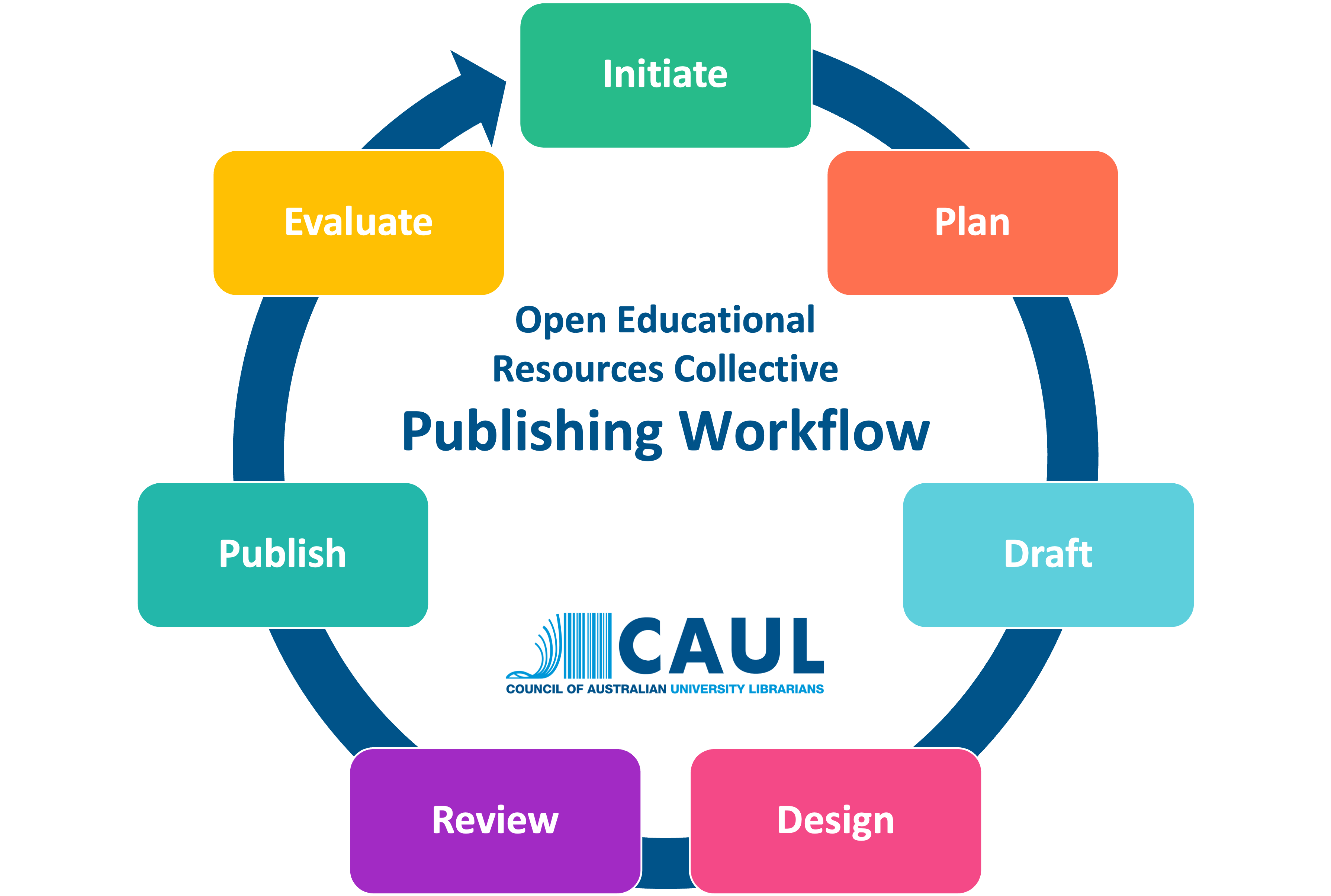CAUL OER Collective - Library open textbook project
The UNE Library is participating in the CAUL OER Collective which provides institutions an opportunity to publish open textbooks written by their authors on the Pressbooks platform. Since 2022, seven open textbooks have been selected via an Expression of Interest process across education, criminology, social work, mathematics, chemistry, ancient Greek, and rural crime.
Check out some of the OER texbooks already created by other member universities under the CAUL OER Collective.
What makes an open textbook 'open'?
An open textbook is a type of OER. It is a textbook that is created to be accessed free of cost, with use and re-use permissions granted upfront through an open licence such as a Creative Commons licence.
Copyright stays with the creator or their institution, as opposed to being assigned or licensed to a publisher under traditional publishing agreements. Depending on the Creative Commons licence attached to the textbook, creators and users of open textbooks (both teachers and students) engage in some or all of the 5R activities:
- Retain - make, own, and control a copy of the resource (e.g., download and keep your own copy, duplicate, and store)
- Revise - edit, adapt, and modify your copy of the resource (e.g., translate into another language)
- Remix - combine your original or revised copy of the resource with other existing material to create something new (e.g., make a mashup)
- Reuse - use your original, revised, or remixed copy of the resource publicly (e.g., on a website, in a presentation, in a class, in a study group, in a video)
- Redistribute - share copies of your original, revised, or remixed copy of the resource with others (e.g., post a copy online or give one to a friend)
Interested? Read more about the process involved, training and support available, and how to apply to publish an open textbook.
How to develop an open textbook
The publishing workflow for an open textbook is much the same as a traditional, commercial textbook. The CAUL OER Collective and UNE Library will provide ongoing support, training and resources throughout the publishing workflow. Learn more about each stage of the publishing workflow.
Author Community of Practice
The Academic Author Community of Practice is for academics at participating institutions who are authoring a book for publication on the Pressbooks platform. The purpose of the Community of Practice is to provide a supportive environment for professional development, information sharing and networking for authors. The Community of Practice will operate by informal communication e.g. a mailing list, and formal, structured meetings every few months to discuss elements of the publishing workflow. Authors can join the Community of Practice at any stage throughout the year, although they will benefit most from participating from the outset.
Publishing on the Pressbooks platform
As well as creating textual content for the open textbook, you can enrich content and make interactive content:
- Embed multimedia
- Add accessible math notation
- Add assessment pieces with H5P
- Include videos / audio
- Quizzes
- Multiple file formats to choose from
- Connect to the LMS
Apply: Finding and developing open textbooks
There are several search tools to find existing open textbooks. Some of the larger search tools include:
- OpenStax
- OER Commons (Higher Education open textbooks)
- CSU affordable learning solutions - Type in a commercial textbook ISBN and find open alternatives
- OASIS – Search tool covering 100+ sources and over 440,000 records. Search by subject or material type
- Mason OER Metafinder (MOM) – Searches standard OER sites and OER repositories
Local examples:
For more information about finding existing open textbooks, please visit the UNE OER libguide.
You don’t have to start a new open textbook from scratch. A key element of OERs is that they can be adapted, built on, and improved!
Adrian Stagg (2014) at the University of Southern Queensland, identifies several ways to develop an open textbook:
- Original Sharing - an original authored textbook is openly licensed and shared with others
- Passive Remix - a single item is identified which aligns well (but not completely) to the learning and teaching needs, and the decision is made to localise the content
- Active Remix - multiple open resources are blended into a new open textbook
- Deveoping (student co-creation) - open collaboration with students to produce an open textbook
For the open textbook pilot, either a passive or active remix may be the best approach given the duration of the pilot.
Can an open textbook have more than one author?
Yes. While the program allows UNE to publish up to four open textbooks, each textbook can have more than one author.
Who is eligible to apply?
Staff affiliated with UNE. Applicants are encouraged to discuss their interest in the program with their supervisors and/or Head of School.
Can students co-author an open textbook under the guidance of a staff member?
Student involvement in the development and revision of OER’s is a key part of the open education movement. However, at this stage in the program we do not have established processes and documentation to incorporate students as co-authors.
APPLICATIONS FOR 2023 HAVE NOW CLOSED
Attributions:
5 R activities: This material is an adaptation of Defining the "Open" in Open Content and Open Educational Resources, which was originally written by David Wiley and published freely under a Creative Commons Attribution 4.0 licence at http://opencontent.org/definition/.
Open Educational Resources Collective Workflow by Council of Australians University Librarians is licensed under CC BY 4.0.


